时间状语从句和原因状语从句专项练习
必备英语【初中英语】状语从句专题练习含答案解析

必备英语【初中英语】状语从句专题练习含答案解析一、初中英语状语从句1.--Where is the comic book?--I brought it to you ________you were in the reading room yesterday.A.when B.if C.because D.before【答案】A【解析】句意:-漫画书在哪里?-昨天当你在阅览室的时候我就拿给你了。
when当…时候;if如果,引导条件状语从句;because因为,引导原因状语从句;before在…之前,引导时间状语从句。
根据句意可知,这里表示“当你在阅览室的时候”,故应选A。
2.---The two old friends were ____ busy ____ with each other that they forgot the time.---Yes. They hadn’t met for over ten years, so they kept talking the whole night.A.too; to talk B.too; talking C.so; to talk D.so; talking;【答案】D【解析】试题分析:句意:这两个老朋友那么忙于交谈以至于忘了时间。
是。
他们十年多没见到了,所以他们聊了一晚上。
考查句式so…that…因此……以至于……;be busy doing忙于做……,故选D。
考点:考查so…that句式。
3.— Is everyone here today?— No, Lucy is at home ________ she has got a high fever.A.because B.if C.until D.unless【答案】A【解析】【详解】句意:——今天大家都到齐了吗?——没有,露西因为发高烧呆在家里了。
A. because因为;B. if如果;C. until直到……才;D. unless除非,如果不。
英语状语从句讲解及练习题(附答案)

(一)状语从句概述定义状语从句用作状语,是起副词作用的句子。
位置状语从句可以放在主句之前,也可以放在主句之后,时间、条件、原因和让步状语从句放在句首时需要用逗号和主句隔开。
分类根据其作用可以分为时间、地点、原因、条件、目的、让步、方式和比较等状语从句。
作用它可以修饰谓语、非谓语动词、定语、状语和整个句子。
(二)状语从句详解1. 时间状语从句引导词用法示例when 意为“当…的时候”。
When引导从句的谓语动词可以是延续性动词,也可以是瞬间动词。
并且when有时表示“就在那时”A liar is not believed when he speaks the truth.说谎者讲真话时也没有人相信。
When he arrives, I’ll call you. When you laugh and smile, your body relaxes.while 意为“在…的时候,在…的同时”。
While引导从句的谓语动词必须是延续性的,发生时间较长,并强While I was standing at the window, I saw several boys running along the street.While John was watching TV, his wife was cooking.调主句和从句的动作同时发生(或者相对应)。
While 有时还可以表示对比。
as 意为“一边…一边…”。
As引导的动作是延续性的,发生时间较短,一般用于主句和从句动作同时发生;as也可以强调一前一后。
The writer was angry as he was travelling on a train to London because someone had invaded his “space”.He smiled as he stood up.after 意为“在…之后”。
表示主句动作发生在从句动作之后。
状语从句专项练习50题

状语从句专项练习50题1. I was doing my homework ______ my mother was cooking dinner.A. whileB. whenC. asD. until答案:A。
本题考查时间状语从句连接词的用法。
“while”强调两个动作同时进行,“我在做作业”和“我妈妈在做晚饭”两个动作同时发生,所以用“while”。
“when”既可表示同时,也可表示先后,在此语境不如“while”贴切。
“as”表示“随着”,不符合句意。
“until”表示“直到”,与句意不符。
2. ______ I was walking in the park, I saw a beautiful bird.A. WhileB. WhenC. As soon asD. Before答案:B。
“when”在此表示一个动作正在进行时,另一个动作突然发生,“我正在公园散步时,看到了一只漂亮的鸟”。
“while”强调两个动作同时持续进行,不太符合。
“as soon as”表示“一……就……”,逻辑不符。
“before”表示“在……之前”,不符合语境。
3. He didn't come home ______ it was dark.A. untilB. whileC. whenD. as答案:A。
“not...until...”是固定搭配,表示“直到……才……”,“他直到天黑才回家”。
“while”“when”“as”都没有这种“直到”的意思。
4. ______ she was reading the book, she fell asleep.A. WhileB. WhenC. AsD. Since答案:A。
“while”强调在“她读书”这个动作进行的过程中“睡着了”。
“when”更多表示动作的先后发生。
“as”有“随着”的意思,不太符合。
“since”表示“自从”,不符合句意。
5. I'll call you ______ I arrive in Beijing.A. whileB. whenC. as soon asD. until答案:C。
初中英语状语从句归纳附练习及答案

初中英语状语从句归纳附练习及答案状语从句是指在句子中充当状语的从句。
它可以修饰动词、形容词、副词等,表示时间、条件、原因、方式等不同的状况。
掌握状语从句的用法对于理解和运用英语句子结构非常重要。
本文将对初中英语中常见的状语从句进行归纳,并提供相应的练习题及答案供大家学习参考。
一、时间状语从句时间状语从句常用when,while,as,before,after,since,until等引导。
表示主句动作发生的时间。
例句1:I will call you when I arrive at the airport.当我到达机场时,我会给你打电话。
例句2:She likes to listen to music while she is doing her homework.她喜欢一边做作业一边听音乐。
练习题:1. He will go to bed _______ he finishes his homework.2. Don't play with fire _______ your parents are not at home.3. You can visit the museum _______ you have free time.1. after2. while3. whenever二、条件状语从句条件状语从句通常使用if或unless引导。
表示条件或假设的情况。
例句1:If it rains tomorrow, we will stay at home.如果明天下雨,我们就待在家里。
例句2:You will pass the exam unless you work hard.除非你努力学习,否则你将无法通过考试。
练习题:1. I will buy a new car _______ I save enough money.2. _______ you study hard, you will fail the exam.3. She won't go shopping with you _______ it stops raining.答案:1. if3. until三、原因状语从句原因状语从句常用because,since,as等引导。
【英语】英语状语从句专项训练100(附答案)及解析
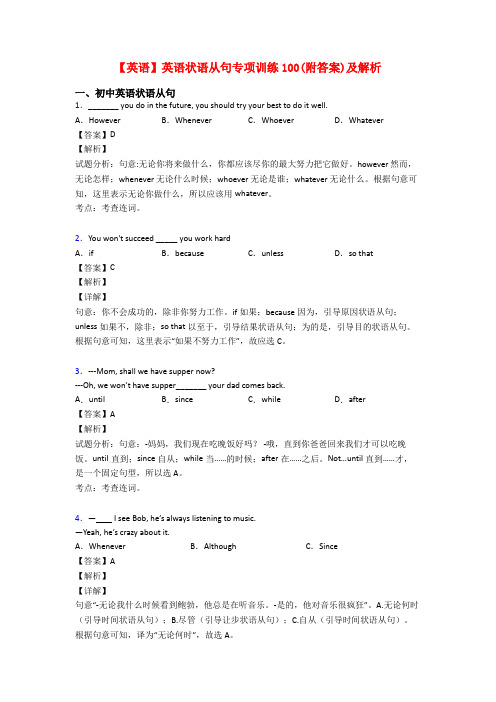
A.unlessB.whenC.ifD.Since
【答案】A
【解析】
【分析】
【详解】
句意:我喜欢新鲜空气,因此我总是让窗户开着,除非真的很冷。考查连词辨析。A.Unless除非,相当于if not,表条件;B.When当……的时候;C.If如果,表条件;D.Since自从。根据I enjoy fresh air so always sleep with the window open可知除非真的很冷否则总是让窗户开着,unless符合题意,故选A。
12._____there was no obvious evidence, most people didn’t think he was guilty of the robbery.
A.WhenB.WhileC.SinceD.As
【答案】C
【解析】
【详解】
句意“由于没有明显的证据,大多数人认为他没有犯抢劫罪”。A.当……时候(引导时间状语从句);B.当……时候(引导时间状语从句);C.since“因为”、“既然”,侧重主句,从句表示显然的或已为人所知的理由,语气比because稍弱;D. as因为,表示的“原因”是双方已知的事实或显而易见的原因,或者理由不是很重要。根据句意可知,因为没有明显的证据,且这个理由很重要,所以人们认为他没有犯抢劫罪,故选C
--- Wonderful. It’s years ____ I enjoyed myself so much.
A.sinceB.afterC.whenD.before
【语法专项训练】状语从句翻译专项练习及答案
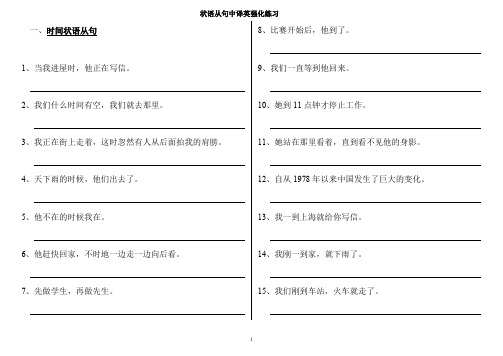
一、时间状语从句1、当我进屋时,他正在写信。
2、我们什么时间有空,我们就去那里。
3、我正在街上走着,这时忽然有人从后面拍我的肩膀。
4、天下雨的时候,他们出去了。
5、他不在的时候我在。
6、他赶快回家,不时地一边走一边向后看。
7、先做学生,再做先生。
8、比赛开始后,他到了。
9、我们一直等到他回来。
10、她到11点钟才停止工作。
11、她站在那里看着,直到看不见他的身影。
12、自从1978年以来中国发生了巨大的变化。
13、我一到上海就给你写信。
14、我刚一到家,就下雨了。
15、我们刚到车站,火车就走了。
16、我们刚开始就被叫停。
17、我每次乘船都晕船。
18、我一听到这首歌,就感到很愉快。
19、下次你来的时候,就会见到他。
二、地点状语从句1、有志者,事竟成。
2、哪里有水,哪里就有生命。
3、你可以随意到你喜欢的任何地方去。
4、无论你去哪都要遵守法律。
三、原因状语从句1、昨天我回来晚了,因为我值班。
2、既然大家都到了,我们开始开会。
3、由于他英语懂得不多,他在字典中查阅这个单词。
4、鉴于天气已经晴朗,我们可以启程了。
5、鉴于他病情严重,我们派人去请医生去了。
四、目的状语从句1、我要把你的电话号码记下来,以免忘记。
2、我把真实情况告诉你,使你能自己作出判断。
3、他们比往常更加努力工作,为了能提前完成工作。
4、多穿点衣服,以免患感冒。
五、结果状语从句1、我们把收音机的音量放大,大家都听到了新闻。
2、他十分激动,以致一句话都说不出来。
3、他说出了这么重要的理由,得到大家的谅解。
4、这是一本十分有意思的书,大家都想看。
六、条件状语从句1、如果我们不怕困难,困难就算不了什么了。
2、除非下雨,我们明天就去那里。
3、只要你努力工作,你就一定能成功。
4、万一我忘了,请提醒我一下。
5、据我所知,那本书下月出版。
七、方式状语从句1、按照我教你的画一只猫。
2、按照人家告诉你做的去做。
3、看上去她好象是生病了。
4、他的行动就好象什么也没有发生。
初中英语状语从句和练习题(含答案)

状语从句的分类一、时间状语从句时间状语从句表示时间,引导词有:when, while, as, till, until before, after, since 等。
时间状语从句的引导词所表示的意思不尽相同,要注意把握不同引导词所表示的不同时间关系,以及它在具体句子中对应的时态、语态等问题。
注意: as(在⋯⋯时候,因为), since (自从,因为),它们可以引导时间从句,并强调主句和从句的动作同事发生。
并且 while 有时还可以表示对比。
例如:( 1)While my mother was reading the newspaper, I was watching TV.(read 是延续性的动词, read 和 watch 同事发生)I like playing football while you like playing basketball. 我喜欢踢足球,而你喜欢打篮球。
(对比)(2) when(当⋯⋯的时候),引导的从句的谓语动词可以是延续性动词,也可以是瞬间动词。
从句动作可与主语动作同事发生,也可在其后发生。
I was reading a book when she came into my room.(come 是瞬间动词,只能用 when 引导,不能用 while)I often missed my home when(while) I lived in NewYork. ( live 是延续性动词, when 可用while 代替)( 3)when 和 while 的区别还在于: while 引导的时间状语从句多用于进行时态,而 when 引导的时间状语从句多用于一般时态。
While they were talking, the bell rang. 正在他们谈话的时候,上课铃响了。
( 4)as 译作“一边⋯⋯一边”、“随着⋯⋯”,侧重主句和从句的动作同时发生。
有时可与when, while 通用。
初中状语从句练习题及答案
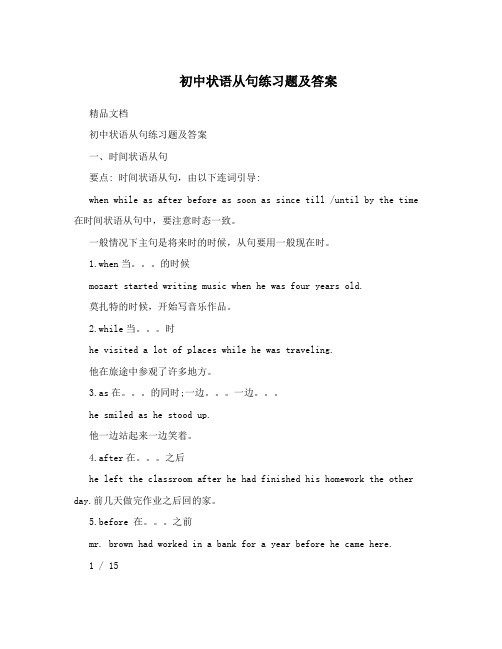
初中状语从句练习题及答案精品文档初中状语从句练习题及答案一、时间状语从句要点: 时间状语从句,由以下连词引导:when while as after before as soon as since till /until by the time 在时间状语从句中,要注意时态一致。
一般情况下主句是将来时的时候,从句要用一般现在时。
1.when当。
的时候mozart started writing music when he was four years old.莫扎特的时候,开始写音乐作品。
2.while当。
时he visited a lot of places while he was traveling.他在旅途中参观了许多地方。
3.as在。
的同时;一边。
一边。
he smiled as he stood up.他一边站起来一边笑着。
4.after在。
之后he left the classroom after he had finished his homework the other day.前几天做完作业之后回的家。
5.before 在。
之前mr. brown had worked in a bank for a year before he came here.1 / 15精品文档布朗先生来这之前已经在一家银行里工作一年了。
6.as soon as 一。
就。
we began to work as soon as we got there.我们一到那就开始工作。
i will write to you as soon as i get home.我一到家就给你写信。
7.since 自。
以来到现在表示自过去的一个起点时间到目前为止的一段持续时间。
主句一般用现在完成时,从句用一般过去时。
mr green has taught in that school since he cameto china three years ago.自格林先生来中国以来,他就在这所学校教书。
专项训练状语从句专项练习题及答案含答案解析

专项训练状语从句专项练习题及答案含答案解析一、初中英语状语从句1.________it’s Sunday tomorrow, we have to go to school.A.Though B.Since C.As D.Because【答案】A【解析】【详解】句意:尽管明天是星期天,我们不得不还要上学。
考查从属连词。
根据后文we have to go to school我们不得不去上学。
可知前面从句应表示让步状语。
故选A。
2.You'd better get home earlier today we can go out for a big meal.A.in order to B.such that C.so that D.in order【答案】C【解析】句意:你最好今天早点回家,这样我们就可以出去吃大餐了。
A. in order to 为了,后跟动词原形;B. such that没有此用法;C. so that为了,引导目的状语从句;D. in order+that+从句,引导目的状语从句。
we can go out for a big meal表示目的的完整句子,所以使用连词词组so that。
故选:C。
3.He was so busy preparing for the high school entrance exam that .A.he had enough time to watch football matches every dayB.he was free enough to go shopping onlineC.he had no time to do sports every day【答案】C【解析】【详解】句意:他忙于准备高中入学考试,以至于他每天都没有时间做运动。
考查结果状语从句。
A. 他每天有足够的时间看足球比赛;B. 他有足够的时间去网上购物;C.他每天都没有时间做运动。
英语语法精讲:状语从句--条件,方式,地点,原因等详细+经典习题(含答案)
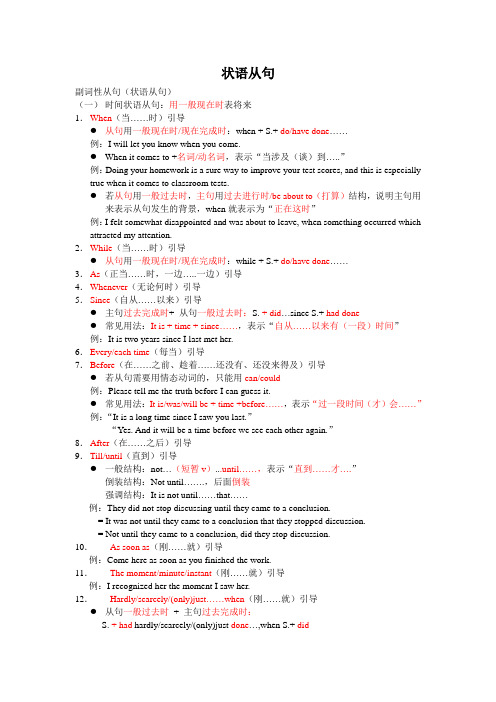
状语从句副词性从句(状语从句)(一)时间状语从句:用一般现在时表将来1.When(当……时)引导●从句用一般现在时/现在完成时:when + S.+ do/have done……例:I will let you know when you come.●When it comes to +名词/动名词,表示“当涉及(谈)到…..”例:Doing your homework is a sure way to improve your test scores, and this is especially true when it comes to classroom tests.●若从句用一般过去时,主句用过去进行时/be about to(打算)结构,说明主句用来表示从句发生的背景,when就表示为“正在这时”例:I felt somewhat disappointed and was about to leave, when something occurred which attracted my attention.2.While(当……时)引导●从句用一般现在时/现在完成时:while + S.+ do/have done……3.As(正当……时,一边…..一边)引导4.Whenever(无论何时)引导5.Since(自从……以来)引导●主句过去完成时+ 从句一般过去时:S. + did…since S.+ had done●常见用法:It is + time + since……,表示“自从……以来有(一段)时间”例:It is two years since I last met her.6.Every/each time(每当)引导7.Before(在……之前、趁着……还没有、还没来得及)引导●若从句需要用情态动词的,只能用can/could例:Please tell me the truth before I can guess it.●常见用法:It is/was/will be + time +before……,表示“过一段时间(才)会……”例:“It is a long time since I saw you last.”“Yes. And it will be a time before we see each other again.”8.After(在……之后)引导9.Till/until(直到)引导●一般结构:not…(短暂v)...until……,表示“直到……才….”倒装结构:Not until…….,后面倒装强调结构:It is not until……that……例:They did not stop discussing until they came to a conclusion.= It was not until they came to a conclusion that they stopped discussion.= Not until they came to a conclusion, did they stop discussion.10.As soon as(刚……就)引导例:Come here as soon as you finished the work.11.The moment/minute/instant(刚……就)引导例:I recognized her the moment I saw her.12.Hardly/scarcely/(only)just……when(刚……就)引导●从句一般过去时+ 主句过去完成时:S. + had hardly/scarcely/(only)just done…,when S.+ did●若hardly/scarcely/(only)just置于句首,主句须倒装(had+ S.+ done)例:He had hardly left school when it began to rain.=Hardly had he left school when it began to rain.13.No sooner……than(刚……就)引导●从句一般过去时+ 主句过去完成时:S. + had no sooner done…, than S.+ did●若no sooner置于句首,主句须倒装(had+ S.+ done)例:We had no sooner reached the top of hill than we all sat down to rest.=No sooner had we reached the top of hill than we all sat down to rest.(二)地点状语从句1.Where(在……地方)引导:从句用一般现在时例:Where there is smoke, there is fire.2.Wherever(无论在哪里)引导例:Wherever he may be, he will be welcome.(三)条件状语从句:用一般现在时表将来1.If(如果、假如)引导:用虚拟语气●if引导得从句中,若有were, had, should三词,可以省略if,并且倒装(谓语置前)例:If I had known about it, I would have told you.= Had I known about it, I would have told you.●If从句+主句= 祈使句/省略句+ and +…….例:If you give me some food, I won’t die of starvation(饥饿).= Some food and I won’t die of starvation;2.Suppose/supposing(假设)引导例:Suppose we cannot get the necessary equipment(设备), what shall we do? 3.Unless(除非、如果不)引导●Unless从句+主句= 祈使句/省略句+ or +…….例:Unless you give me another drink, I will die of thirst.= Another drink or I will die of thirst.4.As/so long as(只要)引导例:We can surely overcome these difficulties so long as we are closely united.5.If only/only if(只要)引导例:We can surely get gains, if only we work hard.6.In case/lest(万一)例:You should take good care of your kid, in case they are ill.7.Provided/Providing/Given that(假如)引导例:We will let you use the room provided that you keep it clean and tidy.8.On condition that(假如)引导(四)原因状语从句1.Because(因为)引导●表示“直接、唯一的原因”,通常放在句后,可以与not, but, only连用例:He was angry not because we were late but because we made a noise.2.As(因为)引导●表示“显而易见或大家都知道的原因”,语气较弱例:Everyone likes you as you are both kind and honest.3.Since(因为、既然)引导●表示“间接或附带的原因”,通常放在句首例:Since she insists, you must come.4.Now/seeing that(既然)引导例:Now/Seeing that you are all here, let’s try and reach a decision.5.Considering that (考虑到)引导例:Considering that he began learning English only a year ago, he speaks very well. 6.In that(由于、因为)引导例:He was late in that he didn’t catch the first bus.(五)让步状语从句1.Though/although/as(虽然)引导●Though/although…..yet连用,表示“虽然…..但是……”例:Though/although we cannot see air, (yet) it exists everyone.●as引导得从句置于句首,且倒装(表语、状语、动词置于as前)表语倒装:可以省略冠词例:Tried as I was, I stayed up late studying last night.Children as he is, he knows a lot of English.状语倒装:Fast as he read, you can’t finish novel in three days.谓语动词倒装:Try as he would, he couldn’t lift the rock.2.Even if/though(即使)引导例:Nobody lost his patience as though the meeting was long and boring. 3.However/no matter how(无论如何/怎样)引导例:We’ll continue to work, no matter how/however hot it is.4.Whatever/no matter what(无论什么)引导例:Whatever/no matter what r you may do, do your best.5.Whoever/no matter who(无论谁)引导例:Whoever/no matter who all cannot break the rules, we must keep the law. 6.Whether……or/no matter whether…..or….(不管……还是)引导例:Whether/no matter whether you can do or cannot do, you must try it. 7.Whether or not/whether……or not(不管是否……)引导例:Whether or not we had a baby, we couldn’t survive only on my salary.= Whether we had a baby or not, we couldn’t survive only my salary.(六)方式状语从句1.As(如,按照)引导例:When in Roma do as the Romans do.2.Just as(正如)引导例:Most plants need air just as they need water.3.As if/though(好像,仿佛)引导●引导的从句常用虚拟语气,除了叙述的情况实现的可能性较大例:He speaks English as if/though he were an Englishman.例:It looks as if/though the coming autumn harvest will be even better than the last one. (七)目的状语从句1.So that(以便、为了)引导●从句中谓语部分可以用can/could,may/might例:I will give you my phone number, so that you can call me when you arrive here. 2.In order to(以便、为了)引导●从句中谓语部分只能用may/might例:We should do our utmost最大可能in order that we may be able to overfulfil 超额完成the task.3.For fear that/lest(以免、以防)引导●从句用虚拟语气“should +V.”例:Batteries 电池must be kept in dry place for fear that/lest electricity should leak 渗漏away.4.In case(以免、以防)引导●从句中谓语部分不用虚拟语气例:Better take more clothes in case the weather is cold.(八)结果状语从1.that(因而)引导例:What’s the matter that they still haven’t answered our e-mail?2.so that(因而)引导●主句,+ so that,且从句中谓语部分只能用may/might例:The temperature is increased , so that the volume of the gas can become greater. 3.So…..that(如此……以至)引导●so +形容词/副词+a/an+名词+ that例:It is so hot a day that we cannot sleep.●so置于句首时,需倒装状语例:So fast did he run that I could not keep up with him●so + much/little/few/many + that,而不用such…..that例:She has so little education that she is unable to get a job.4.Such…..that(如此……以至)引导●Such +名词(可数的单数名词)+ that例:It is such a lovely day that everybody is feeling happy and gay.(九)比较状语从句1.Than(比……)引导例:There are more vocabularies in this unit than in that one.2.As……as(如……一样)引导●As +形容词/副词+a/an+名词+ as + 省略句例:He is as clever a boy as his brother.例:This book is nearly as thick as that one(is).3.Not so……as(不如……一样)引导●As +形容词/副词+a/an+名词+ as + 省略句例:You are not as tall as she.4.The+比较级,the+比较级(越……越…….)引导例:The hotter that air becomes, the lighter it gets.例题1、()______ your daughter has not come back , let me take you to the Friendship Hospital.A WhenB SinceC ThatD For2、()______ Tom is not feeling well today , he has to stay at home.A ThoughB ForC FindingD As3、()They are ______ hard-working students that they have already made ______ much progress since thay came here.A so ; soB such ; suchC so ; suchD such ; so4、()______ we have finished the book we shall start doing some exercises.A For nowB Since nowC Now thatD Since now5、()He asked us not to be noisy ______ we should wake the baby.A in cseB in the caseC in case ofD in this case巩固练习1、()______ you are familiar with the auther`s ideas , by reading all the sections as quickly as you can.A Ever sinceB As long asC So thatD Now that2、()The boy has to learn ______ things that he hardly has time for play.A so manyB such manyC so fewD such few3、()In the old days the poor worker worked long hours every day ______ he could support his whole family.A becauseB thoughC unlessD so that4、()Tell him that I will call him back , ______ he gives me a call.A in most casesB in caseC in any caseD in case of5、()______ you have reminded me , I will try to be a teacher.A Now thenB So thatC Now thatD In order that6、()You will have to study for many years ______ you may become a brain surgeon.A in order thatB in thatC althoughD soKey 1~5 BDDCA 1~6 DADBCA二、习题1、()It is almost impossible to become skilful in speaking a language ______ you use it constantly.A but forB if onlyC exceptD unless2、()Everything will be all right ______ Tom is left to do the work in his own way.A as far asB mean whileC so long asD in case3、()Do remind me of the date again tomorrow ______ I forget.A in caseB except thatC even ifD as though4、()You must do the experiment ______ the teacher told you.A asB sinceC so thatD unless5、()I could not resist having another piece of cake even ______ I was supposed to lose weight.A althoughB howeverC otherwiseD though6、()______ I suggest , he always disagree.A WhatB HowC WhateverD How a7、()However ______ you hate them , you must work with them.A very muchB too muchC much tooD much8、()Try ______ he might , Tom could not get out of the trouble.A as ifB altoughC ifD as9、()______ whales are very large , they are no longer an even match for man.A SinceB BecauseC Now thatD Although10、()Man must have food just ______ plants must have sunlight.A forB likeC becauseD as巩固练习1、()______ I know , the visitors are all satisfied with the arrangement in the next few days.A As far asB As long asC As well asD As soon as2、()______ convincing an argument is , it needs support of evidence.A No matterB ThoughC HoweverD As3、()Anyone can borrow books from the library ______ he has a library card.A so long asB sinceC even thoughD unless4、()______ much advice I gave him , he did exactly what he wanted to do.A HowB WhateverC WhatD No matter how5、()Remember , science requires your whole life ______ you had two lives to give , they would not be enough.A AlthoughB ThoughC If onlyD Even if6、()I am sure that Laura`s latest play , ______ staged , will prove a great success.A sinceB unlessC onceD until7、()Send us a message , ______ you have any difficulty.A in case thatB in caseC whileD as8、()Electricity flows through a wire ______ water flows through a pipe.A whileB just asC much asD whenever9、()Food shortage will long be a world problem ______ much has been done to supply enough for everyone.A althoughB evenC no matterD since10、()I do not like the city , ______ though I have been living here for more than ten years.A evenB asC everD butkey1~5 DCAAD 6~10 CDDDD 1~5 ACADD 6~10 CBBAA。
状语从句讲解及练习题50题-有答案

状语从句1.在主从复合句中修饰主句中的动词,形容词,副词等的从句叫状语从句。
可分为,时间状语从句,地点状语从句,原因,目的,结果,条件,让步,比较和方式状语从句。
2.时间状语从句起时间状语作用的句子;可放在句首,句中和句尾常用引导词:when,while, as, after, before, since, till, until, the moment, hardly … when , no sooner … thanwhen, while, as的用法1)when 用法最广,常可代替while和as, 在while 引导的从句中,动词只能是延续性的When the fire broke out, all the students were sleeping soundly.The telephone rang while I was taking a bath.2)当两个表示时间延续的动作同时发生而又有对比意味的时候,用while,在这样的复合句中,主句从句的时态通常是相同的。
Father was preparing a report while I was playing PC games.3)常用as 的情况:一边…一边;表示随着短暂动作的发生,另一行为伴随发生As he talked on, he got more and more excited.until和till的用法表示“一直到…”时,主句和从句都用肯定式;I will wait until/ till the concert is over.表示“直到…才…”是,主句用否定,从句用肯定式。
They can’t go until Sunday.since的用法since引导的从句中,如果是持续性动词,往往理解为某一状态的终止。
He has written to me frequently since he was ill. 自从他病好以来,他常写信给我。
状语从句练习Ⅱ(时间、原因、结果、地点状语从句)

状语从句练习Ⅱ(时间、原因、结果、地点状语从句)2010-12-61.I’ll let you know ____ he comes back.A. beforeB. becauseC. as soon asD. although2. We will work ____ we are needed.A. wheneverB. becauseC. sinceD. wherever3. Read it aloud _____ the class can hear you.A. so thatB. ifC. whenD. although4._____ you go, don't forget your people.A. WheneverB. HoweverC. WhereverD. Whichever5. It is about ten years _____ I met you last.A. sinceB. forC. whenD. as6. I learned a little Russian _____ I was at middle school.A. thoughB. althoughC. as ifD. when7. _____ we got to the station, the train had left already.A. IfB. UnlessC. SinceD. When8. _____ the rain stops, we' 11 set off for the station.A. BeforeB. UnlessC. As soon asD. Though9. She was _____ tired _____ she could not move an inch.A. so, thatB. such, thatC. very, thatD. so, as10. Speak to him slowly _____ he may understand you better.A. sinceB. so thatC. forD. because11. When you read the book, you' d better make a mark _____ you have any questions.A. at whichB. at whereC. the placeD. where12. I hurried _____ I wouldn't be late for class.A. sinceB. so thatC. as ifD. unless13. Bring it nearer _____ I may see it better.A. althoughB. even thoughC. so thatD. since14. The child was _______________________ immediately after supper.A. enough tired to go to bedB. too tired to go to bedC. so tired that he went to bedD. very tired, he went to bed15. _____ David goes, he is welcome.A. WhicheverB. HoweverC. WhereverD. Whatever16. The house stood _____ there had been a rock.A. whichB. at whichC. whenD. where17.—What was the party like?—Wonderful. It' s years _____ I enjoyed myself so much.A. afterB. whenC. beforeD. since18. It was not _____ she took off her dark glasses _____ I realized she was a famous film star.A. when; thatB. until; thatC. until; whenD. when; then19. After the war, a new school building was put up _____ there had once been a theatre.A. thatB. whereC. whichD. when20. It was ____ that she couldn’t finish it by herself.A. so difficult a workB. such a difficult workC. so difficult workD. such difficult work1-5 CADAC 6-10 ABCBA 11-15 DDCAB 16-20 DABAD 21-25 CABBA26-30 BCCBD 31-35 BACDD 36-40 ADCDD 41-45 CCBAD 46-50 DBCBD51-53 CDD------------------------------------------------------------ 感谢您的阅读,祝您生活愉快。
状语从句 专项练习(时状、条状) 含答案
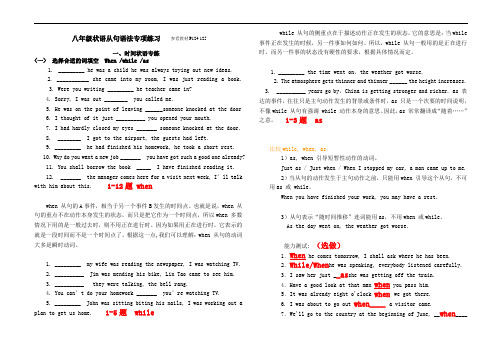
.八年级状语从句语法专项练习参看教材P124-125一、时间状语专练<一> 选择合适的词填空 When /while /as1. _________ he was a child he was always trying out new ideas.2. ___________ she came into my room, I was just reading a book.3. Were you writing _________ he teacher came in?4. Sorry, I was out ________ you called me.5. He was on the point of leaving ______someone knocked at the door6. I thought of it just __________ you opened your mouth.7. I had hardly closed my eyes _______ someone knocked at the door.8. ________ I got to the airport, the guests had left.9. _________ he had finished his homework, he took a short rest.10. Why do you want a new job _______ you have got such a good one already?11. You shall borrow the book _____ I have finished reading it.12. _______ the manager comes here for a visit next week, I’ll talk with him about this. 1-12题 whenwhen 从句的A事件,相当于另一个事件B发生的时间点。
初中状语从句总结及练习(附答案)
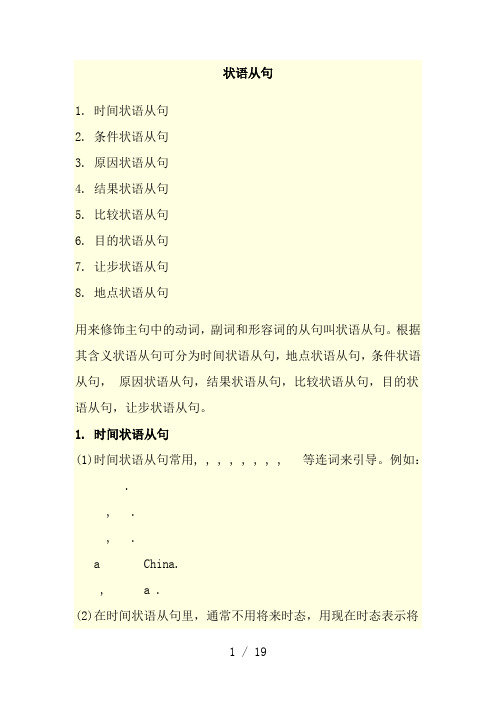
状语从句1. 时间状语从句2. 条件状语从句3. 原因状语从句4. 结果状语从句5. 比较状语从句6. 目的状语从句7. 让步状语从句8. 地点状语从句用来修饰主句中的动词,副词和形容词的从句叫状语从句。
根据其含义状语从句可分为时间状语从句,地点状语从句,条件状语从句,原因状语从句,结果状语从句,比较状语从句,目的状语从句,让步状语从句。
1. 时间状语从句(1)时间状语从句常用, , , , , , , , 等连词来引导。
例如: ., ., .a China., a .(2)在时间状语从句里,通常不用将来时态,用现在时态表示将来的动作或状态。
例如:I’ I .I .’t .(3)在带有或引导的时间状语从句的主从复合句里,如果主句用肯定式,其含义是“一直到……时”,谓语动词只能用延续性动词。
如果主句用否定式,其含义是“直到……才……”, “在……以前不……”, 谓语动词可用瞬间动词。
例如:.’s .’t .’t .2. 条件状语从句(1)条件状语从句通常由, 引导。
例如:?’t I .(2)在条件状语从句里,谓语动词通常用现在时态表示将来的动作或状态。
例如:I’ .’t .(3)“祈使句 + ()+ 陈述句” 在意思上相当于一个带有条件状语从句的复合句。
例如:, ’ .’t , ’ .., .3. 原因状语从句(1)原因状语从句通常由, , 引导。
例如:’t ., .’t , I’ .(2)表示直接原因,语气最强。
引导的原因状语从句多放在主句之后。
回答由提出的问题,只能用。
和语气较弱,一般用来表示明显的原因。
由和引导的原因状语从居多放在句首。
例如:’t ?I ’t ., ’t ., ’t .(3)和不能同用在一个句子里。
4. 结果状语从句(1)结果状语从句由…, …, 引导。
例如:’t a .a ., I ’t .(2)…语可以互换。
例如:在由引导的结果状语从句中,是副词,与形容词连用。
其结构是: “ + 形容词(副词)+ + 从句”。
(完整版)状语从句练习

(完整版)状语从句练习状语从句状语从句:指把一句子当着副词作状语时,修饰动词、或整个句子;根据它在句中的作用可分为时间、地点、原因、条件、目的、结果、让步、方式和比较等从句;状语从句前一般由连词(从属连词)引导,也可以由词组引导。
它常位于句首;若位于句中,常用逗号与主句隔开;位于句尾时可以不用逗号隔开。
一、时间状语从句1. 通常由以下连词弓丨导:when / while / as/ after/ before/ as soon as/ since/ till /until / by the time2. 在时间状语从句中,要注意时态一致。
(主将从现)1).when 当…..的时候: Mozart started writing music when he was four years old.2).while 在…期间: He visited a lot of places while he was traveling.3).as 在…的同时;一边…一边...: He smiled as he stood up.4).after 在...之后: He left the classroom after he had finished his homework the other day.5).before 在...之前Mr. brown had worked in a bank for a year before he came here.6).as soon as 一...就... We bega n to work as soon as we got there. I will write to you as soon as i get home.7).since 自...以来(至U现在) Mr green has taught in that school since he came to china three years ago.8)till /until 直至U : They walked till /until it was dark. Tom didn ' t leave home till / until his father came back.难点---- as/ when/ while的辨析as when while都表示主、从句动作同时发生,三者差异如下:as表示一边…一边"/随着,强调两个动作同时进行,I am cooking as I am singing.when 当…..的时候,从句动作可在主句动作"之前"或"之后"发生lit was raining hard when (as) i got there. 还可表and then; at that moment (正在那个时候/突然):I am leaving for Beijing when the phone rang.while 在…期间从句动作为延续性动词或状态词I am cooki ng while I am si ngi ng然而((表转折,对比)she thought I was talking about her daughter, while I was talking about my daughter.Mother was worried because little Alice was ill, especially as (when/ while) father was away.二、条件状语从句要点:状语从句由连词if (如果)、unless (=if not)(除非)弓I导。
(完整word版)时间、条件、原因状语从句练习【专项练习,简单】.

【状语从句练习】选择题【 1】( 1 The meeting didn’t start___ everyone was there.A. because B。
until C。
why D。
if( 2 The boy ___ to bed ___ his mother came in.A. went not; until B。
didn't go; after C. went; until D。
didn’t go; until ( 3 I won’t believe you___ I hav e seen it with my own eyes。
A。
before B. until C. after D. when( 4 He ___ home ___ she was satisfied ___ his answer yesterday.A. didn't go; until; with B。
wasn’t go; after; toC. doesn't go; before; with D。
didn’t go; until; to( 5 He ___ back until the work ___ done。
A. isn’t; will beB. isn't;isC. won’t be; will be D。
won't be; is ( 6 They didn't start the work ___ their teacher came back。
A。
until B. while C。
as soon as D。
if【 2】( 1 Tom will call me as soon as he ___ Shanghai.A. arrives B。
will reach C. arrives in D. get to( 2 I'm sure he’ll come to see me before he ___ Beijing.A. will leaveB. is leavingC. leaveD. leaves( 3 I will tell him the news as soon as he___ back.A. comeB. comesC. will come D。
高中英语状语从句讲解及练习(含答案)
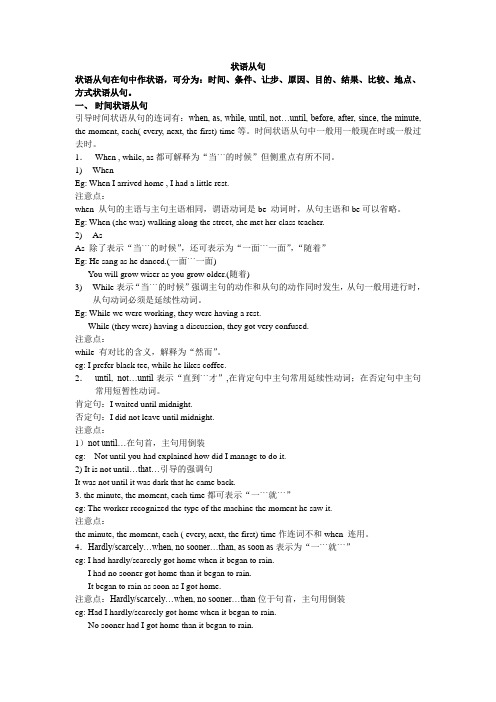
状语从句状语从句在句中作状语,可分为:时间、条件、让步、原因、目的、结果、比较、地点、方式状语从句。
一、时间状语从句引导时间状语从句的连词有:when, as, while, until, not…until, before, after, since, the minute, the moment, each( every, next, the first) time等。
时间状语从句中一般用一般现在时或一般过去时。
1.When , while, as都可解释为“当```的时候”但侧重点有所不同。
1)WhenEg: When I arrived home , I had a little rest.注意点:when 从句的主语与主句主语相同,谓语动词是be 动词时,从句主语和be可以省略。
Eg: When (she was) walking along the street, she met her class teacher.2)AsAs 除了表示“当```的时候”,还可表示为“一面```一面”,“随着”Eg: He sang as he danced.(一面```一面)You will grow wiser as you grow older.(随着)3)While表示“当```的时候”强调主句的动作和从句的动作同时发生,从句一般用进行时,从句动词必须是延续性动词。
Eg: While we were working, they were having a rest.While (they were) having a discussion, they got very confused.注意点:while 有对比的含义,解释为“然而”。
eg: I prefer black tee, while he likes coffee.2.until, not…until表示“直到```才”,在肯定句中主句常用延续性动词;在否定句中主句常用短暂性动词。
五年级英语状语从句练习题40题含答案解析
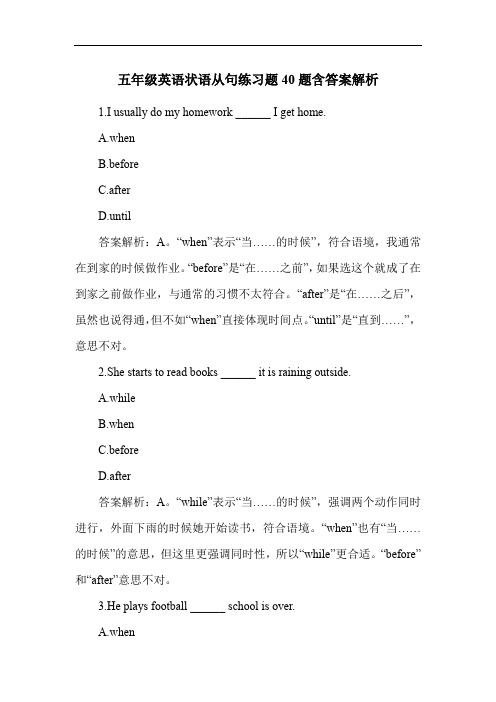
五年级英语状语从句练习题40题含答案解析1.I usually do my homework ______ I get home.A.whenB.beforeC.afterD.until答案解析:A。
“when”表示“当……的时候”,符合语境,我通常在到家的时候做作业。
“before”是“在……之前”,如果选这个就成了在到家之前做作业,与通常的习惯不太符合。
“after”是“在……之后”,虽然也说得通,但不如“when”直接体现时间点。
“until”是“直到……”,意思不对。
2.She starts to read books ______ it is raining outside.A.whileB.whenC.beforeD.after答案解析:A。
“while”表示“当……的时候”,强调两个动作同时进行,外面下雨的时候她开始读书,符合语境。
“when”也有“当……的时候”的意思,但这里更强调同时性,所以“while”更合适。
“before”和“after”意思不对。
3.He plays football ______ school is over.A.whenC.afterD.until答案解析:C。
学校结束后他去踢足球,“after”表示“在……之后”符合语境。
“when”不太准确,“before”意思反了,“until”是“直到……”不符合。
4.I brush my teeth ______ I go to bed.A.whenB.beforeC.afterD.while答案解析:B。
我在睡觉之前刷牙,“before”符合语境。
“when”不准确,“after”意思反了,“while”强调同时性不合适。
5.She eats breakfast ______ it is seven o'clock.A.whenB.beforeC.afterD.until答案解析:A。
当七点的时候她吃早餐,“when”符合语境。
- 1、下载文档前请自行甄别文档内容的完整性,平台不提供额外的编辑、内容补充、找答案等附加服务。
- 2、"仅部分预览"的文档,不可在线预览部分如存在完整性等问题,可反馈申请退款(可完整预览的文档不适用该条件!)。
- 3、如文档侵犯您的权益,请联系客服反馈,我们会尽快为您处理(人工客服工作时间:9:00-18:30)。
时间状语从句和原因状语从句专项练习Revised on November 25, 2020时间状语从句和原因状语从句专项练习I. Choose the best answer.1. I considered her hard-working and kind _______ I got to know her in the bookstore.A. first timeB. for the first timeC. the first timeD. by the first time2. It was not _______ he took off his dark glasses _______I realized who he was.A. when; thatB. until; whenC. when; thenD. until; that3. It had been many years _____ Mandela, the former president of South Africa, was set free from prison.A. beforeB. sinceC. untilD. that4. _______ had the bell rung ______ the students took their seats.A. Hardly; whenB. No sooner; whenC. Hardly; thanD. No sooner; then5. We had been walking along the beach for nearly three hours _____ we saw a boat on the sea.A. whenB. beforeC. unlessD. until6. The two brothers quarreled and quarreled _______ they felt sleepy and went to bed.A. whenB. beforeC. unlessD. until7. —What was the party like—Wonderful. It’s years _______ I enjoyed myself so much.A. afterB. beforeC. whenD. since8. It was quite a long time _______ I made out what had happened.A. afterB. beforeC. whenD. since9. _______, he went upstairs to sleep without supper.A. He was tiredB. As he was tiredC. Tired as he wasD. As tired as he was10. We sent the injured to the First-aid Centre_______ the accident happened.A. immediatelyB. hurriedlyC. quicklyD. shortlyII. Fill in the blanks with proper conjunctions.11. She looks unhappy recently _______ her demand has been turned down by her boss.12. _______ times have changed, good revolutionary traditions can’t be thrown away.13. _______ all the world were against me, I should still hold to my opinion.14. _______ she got the pay, she put it away in the bank.15. I was wandering through the street _______ I caught sight of a tailor’s shop.16. He was drinking juice _______ the rest of us drank whisky.17. _______ you read the poem a second time, the meaning will become clearer to you.18. We walked along the seaside about two hours _______ we came to a fisherman’s village.19. The sailor stayed on the lonely island ____ a ship passed there and rescued him.20. It was eight years_______ the Chinese people drove off the Japanese aggressors.参考答案:1—5 CDAAB 6—10 DDBBA11. because 12. Though / Although 13. (Even) Though 14. As soon as 15. when 16. while 17. When/If 18. before 19. until 20. before英语语法连词状语从句训练专题根据A句完成B句,使两句意思一致,每空只填一词:1. A: Jane is a singer. She is also a dancer.B: Jane is ______ ______ a singer ______ ______ a dancer.2. A: We should learn from books and we should learn from teachers.B: We should learn ______ from books ______ from teachers.3. A: His mother can’t help him with his lessons, and his father can’t, either.B: ______ his mother ______ his father can help him with his lessons.4. A: It’s hard work, but I enjoy it.B: ______ it’s hard work, I enjoy it.5. A: Men can’t live without air and water.B: Men will die without air ______ water.6. A: If you stand higher, you will see farther.B: Stand higher, ______ you will see farther.7. A: If you don’t work harder, you will fail in the exam.B: Work harder, ______ you won’t pass the exam.8. A: How important the meeting is! I can’t miss it.B: It is ______ ____ important meeting ______ I can’t miss it.9. A: After the mother came back, the boy went to bed.B: The boy ______ go to bed ______ his mother came back.10. A: There’re many rabbits there. They can’t kill them all.B: There’re ______ many rabbits there ______ they can’t kill them all.11. A: When I get there, I’ll go to see him at once.B: I’ll go to see him ______ ______ ______ I get there.12. A: You may stay at home. You may also go out with us.(江西B: You may ______ stay at home ______ go out with us.13. A: Mary is the tallest girl in her class.(1999福州)B: Mary is ______ ______ any other girl in her class.14. A: Peter draws well. Henry draws well, too.(1999广西)B: Henry draws ______ ______ ______ Peter.15. A: Mary runs faster than my sister.(1999兰州)B: My sister doesn’t run ______ ______ ______ Mary does.16. A: Uncle Wang finished his work. He went home.B: Uncle Wang ______ go home ______ he finished his work.17. A: Lucy has been away from the USA for 5 years.(内蒙古B: It’s 5 years ______ she ______ the USA.18. A: “Does the girl need any help” he asked me.(甘肃)B: He asked me ______ the girl ______ some help.19. A: Mrs. Smith is my teacher. She is also my good friend.B: Mrs. Smith is ______ ______ my teacher ______ ______ my good friend.20. A: “Nanjing has changed a lot these years.” “That’s right.”B: “Nanjing has changed a lot these years.” “______ it ______.”二、在下列各句中填入适当的状语从句连词,使句子意思完整、通顺rains, I go to school by bus. when2. I will tell you the secret _____ you don't tell anyone else about it. (as long as)3. Mary always takes a seat in the first row ______ she can hear better. (where)4. We didn't notice anything wrong with the computer ______we started using it. (until)5. The young doctor was a bit worried ____it was his first time to operate on a patient. (as, because)6. We should study foreign languages ___hard ___Marx did. (as, as)elephant has ___strong a body ___it can do heavy work for people. (so, that)is ___a difficult problem____ nobody can work it out. (such, that)四:各类从句( ) 1. They didn’t start the work ____ their teacher came back.A. untilB. whileC. as soon asD. if( ) 2. The dictionary cost me too much, ____ it’s really useful.A. andB. soC. butD. or( ) 3. –Carl, are you interested in swimming--Yes, ____ I’m not good at it at all.A. soB. andC. orD. but( ) 4. You’ll be late ____ you don’t get up early tomorrow morning.A. IfB. whenC. beforeD. until( ) 5. I’d like to change this pair of trousers, ____ you give me my money back.A. soB. orC. butD. and( ) 6. Alice wanted to know ____ her grandmother liked the bag.A. thatB. ifC. whichD. what( ) 7. Mr John has worked in that small town ____ he left Canada in 1998.A. whenB. afterC. forD. since( ) 8. That was our first lesson, ____ she didn’t know all our names.A. forB. butC. soD. or( ) 9. ____ Saturday ____ Sunday is OK. I’ll be free on these two days.A. Either; orB. Neither; norC. Both; andD. One; the other( ) 10. He listened to the music ____ he was washing his clothes.A. afterB. beforeC. thatD. while( ) 11. ____ there are too many people here, ____ we have to find another house.A. Because; soB. Though; butC. Since; /D. /; if ( ) 12. Can you tell me ____ the nearest hospital isA. whatB. howC. whetherD. where( ) 13. Don’t drink too much tea in the evening, ____ you won’t fall asleep.A. andB. soC. orD. but( ) 14. ____ he is very young, ____ he knows several languages.A. Though; butB. Because; soC. Though; /D. Because; /( ) 15. Go down the street ____ you see the third crossing.A. thoughB. sinceC. untilD. while ( ) 16. He was ____ tired ____ he couldn’t go on working.A. too; toB. such; thatC. so; thatD. too; that ( ) 17. You’d better take this book. It is very good ____ it’s a bit expensive.A. thoughB. andC. butD. so五:综合型1. ____ he is very young, ____ he knows a lot about science.A. Though; butB. Because; soC. Though; /D. When; and2. She was ____ we all like her.A. such a good singerB. such a good singer thatC. a very good singer thatD. so good singer that3. I’ll give her the message ____ she comes back.A. tillB. beforeC. sinceD. as soon as4. Mother didn’t go to bed ____ she finished cleaning the room.A. afterB. untilC. becauseD. while5. It is a long time ____ we met last time in Shanghai.A. beforeB. afterC. sinceD. for6. Can you tell me ____ is she going to give me as a presentA. whereB. whenC. whoD. what7. Rose is an English girl, ____ she doesn’t lik e English food.A. yetB. soC. forD. and8. Tom laughed ____ the others did, ____ he didn’t understand the story.A. like; thoughB. as; thoug hC. like; becauseD. as; as9. I didn’t hear ____ he said just now.A. thatB. whatC. whichD. it10. They were reading ____ the lights were out.A. asB. whenC. whileD. until11. Could you tell me ____ his father is likeA. thatB. howC. whyD. what12. The meeting didn't start___ everyone was there.A. becauseB. untilC. whyD. if13. I won't believe you_____ I have seen it with my own eyes.A. beforeB. untilC. afterD. when14 I'm sure he'll come to see me before he ___ Beijing.A. will leaveB. is leavingC. leaveD. leaves15. By the end of last term, I___ ten books.A. had finished readingB. have finished readingC. had finished to readD. finished read16. I ___ you for a long time. Where ___ you ___A. didn't see; did; goB. didn't see; have; goneC. haven't seen; have; beenD. haven't seen; have; gone17. _____ he came to study in the university, he has made much progress in the study of English.A. WhileB. WhenC. SinceD. After18. I'd like to go swimming _____ the water is not too cold.A. forB. unlessC. ifD. whether19. Suzhou is not ____ beautiful ____ Hangzhou.A. as; thanB. so; asC. even; thanD. /; than20 Iron is more useful ___ any other metal.A. asB. thanC. thenD. so。
